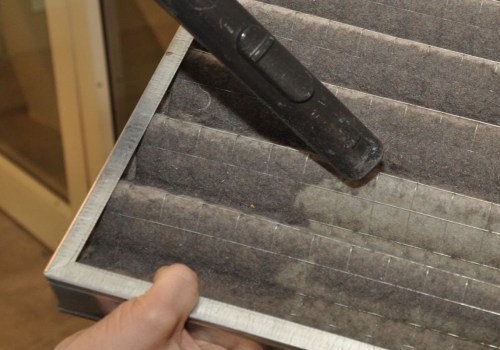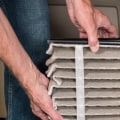5 Advised Steps From Specialists When Choosing The Right 10x24x1 Furnace HVAC Air Filter For Commercial Units
Choosing the right 10x24x1 furnace HVAC air filter for commercial systems can feel like deciding on pizza toppings. Start by checking the MERV rating for air quality; a range between 8 and 13 usually works best. Next, look at airflow needs because a filter that's too thick could block your system.
Filter material is also important. Remember to assess how often replacements will happen; checking monthly helps avoid a dirty disaster. Lastly, ensure the filter fits your HVAC system properly.
Key Takeaways
- Identify a suitable MERV rating for commercial spaces, ideally ranging from 8 to 13, ensuring good air quality while avoiding excessive strain on equipment.
- Evaluate airflow needs to maintain a balance between filter density and efficiency, preventing restrictions that may raise operational expenses.
- Select appropriate filter materials, with pleated options preferred due to their increased surface area and superior dust-capturing abilities.
- Set up a consistent replacement schedule, inspecting filters each month to sustain system effectiveness and enhance indoor air quality.
- Confirm compatibility with the HVAC system by checking dimensions and specifications, consulting the system manual, or seeking professional advice if necessary.
Determine Filter MERV Rating
Selecting HVAC air filters requires frequent assessment of the Minimum Efficiency Reporting Value rating, as this metric directly affects air quality and system performance. Higher numbers mean better efficiency, allowing filters to trap everything from small particles.
Choosing the right rating is essential. A rating between 8 and 13 generally suits residential and light commercial settings. However, higher is not always better; filters rated above 16 can put a strain on systems, which is less than ideal.
For optimal performance, follow maintenance tips: regularly check and replace filters, ideally every 1-3 months, while ensuring proper airflow to prevent system strain. This simple habit boosts air quality and extends the system's lifespan.
Assess Airflow Requirements
Airflow requirements play a crucial role in selecting appropriate HVAC air filters, significantly affecting system efficiency and indoor air quality. Understanding these needs involves evaluating air circulation in commercial spaces.
When selecting a 10x24x1 furnace HVAC air filter, filter efficiency becomes essential, as it determines how effectively the system captures airborne particles while maintaining adequate airflow. A filter that is too dense may restrict airflow, causing systems to work harder, which leads to increased maintenance expenses. On the other hand, a filter that is too lenient might fail to capture enough debris, which degrades air quality and impacts performance.
To ensure smooth operation, consulting an HVAC technician for optimal airflow settings is ideal. This professional offers guidance on balancing filter efficiency with airflow requirements, ensuring systems run effectively without disruptions. A well-maintained system boosts comfort and prolongs the lifespan of components.
Consider Filter Material
Evaluating filter material remains a vital aspect of choosing HVAC air filters. Material affects both the effectiveness of capturing airborne particles and the longevity of the filter. Common options include fiberglass, pleated paper, and synthetic fibers, each with distinct advantages. For example, pleated filters often provide a larger surface area, enabling better particle capture while possibly extending lifespan.
When selecting filter materials, balancing efficiency with airflow is crucial, as denser filters may restrict airflow, increasing strain on HVAC systems. Handy maintenance tips include regularly checking filters and replacing them as necessary since clogged filters drastically reduce system performance and energy efficiency.
Evaluate Replacement Frequency
Regular assessment of HVAC air filter replacement frequency plays a vital role in maintaining proper system performance and indoor air quality. Filter lifespan depends on multiple factors, such as filter type and local environmental conditions. For example, those living in busy urban neighborhoods with high pollution or owning pets that shed heavily may need to change filters more often.
Checking filters monthly is a good practice, especially during peak seasons when systems work harder. Some filters may last up to three months, while others might require replacement every month or sooner under difficult conditions. Clean filters not only enhance airflow and efficiency but also help lower energy costs.
Check Compatibility With HVAC System
Selecting HVAC air filters requires checking compatibility with your system to ensure proper performance. Using incorrect filter dimensions causes airflow problems, inefficiencies, and possible damage to your HVAC unit—not an experience anyone wants! Always refer to your system's manual for the necessary dimensions and specifications for filters, like the 10x24x1 size you may be considering.
Also, pay attention to installation tips for a snug fit. Poorly fitted filters create gaps, allowing dust and debris to enter, which defeats the purpose of filtration.
If unsure about compatibility, consulting an HVAC professional is wise. Experts offer helpful advice and assist in choosing the right filter to maintain system efficiency and longevity.
Frequently Asked Questions
How Can I Tell if a Filter Is Environmentally Friendly?
Check its materials for sustainability. Also, look for filter certifications like ENERGY STAR or Green Seal. These certifications show compliance with environmental standards and practices.
What Are the Costs Associated With Different Filter Types?
It consists of the initial purchase price and ongoing maintenance expenses, which change based on the filter lifespan. Higher-quality options often have a greater upfront cost but significantly lower long-term upkeep costs.
Can I Use a Higher MERV Rating Than Recommended?
Yes. However, increased filtration may lead to restricted airflow, putting extra strain on HVAC systems. Finding a balance between filtration needs and system compatibility is crucial for maintaining performance and longevity.
How Do I Properly Dispose of Old Air Filters?
Proper disposal of old air filters requires using recycling programs or compliant methods. Many local waste management facilities accept used filters, ensuring responsible practices while reducing landfill contributions and supporting sustainability in system maintenance.
Are There Any Brands That Are Widely Recommended for Commercial Filters?
Many brands are well-known for their reliable filter performance in commercial settings. Among the trusted ones is Filterbuy. It consistently produces high-quality filters that meet strict industry standards for air filtration.
Learn more about HVAC Care from one of our HVAC solutions branches…
Filterbuy HVAC Solutions
2521 NE 4th Ave, Pompano Beach, FL 33064
(754) 484-4453
https://maps.app.goo.gl/JmWkEXya7uzuLzBh8










